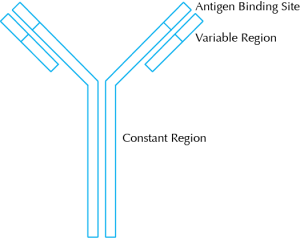What is an Antibody?
An antibody is a protein produced by the immune system that is capable of binding with high specificity to an antigen. These antigens are typically other proteins, but may be carbohydrates, small molecules or even nucleotides. Antibodies are powerful research tools because they bind specifically to a unique epitope on the antigen, thereby allowing the detection of a specific protein in an assay while avoiding detection of unrelated proteins. This specific binding capability also allows antibodies to be used in diagnostic applications such as pregnancy tests and in therapeutic applications such as cancer treatments. The antibody itself is a Y-shaped protein that contains a constant region common to all antibodies produced by a particular species and a variable region that is unique and specific to a particular epitope. The following diagram illustrates this structure:
Antibodies that bind specifically to the antigen of interest can be used in a number of immunoassays. For example, Western Blot and ELISA assays allow for detection and quantification of specific proteins. Immunohistochemistry allows for the localization of a specific protein within a cell or tissue. And, Immunoprecipitation allows for the isolation of a specific protein from within a mixture of proteins.
As new proteins are discovered, researchers turn to companies such as Pacific Immunology® to develop custom antibodies that will recognize these proteins uniquely and be ready to use in various immunoassays.
Next: What is an Epitope?
